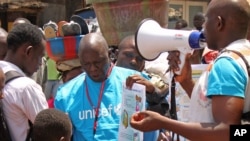Sierra Leone officials said, for now, they have no plans to close the country’s border with Guinea, after a Sierra Leonean woman, who had visited Guinea, died from the Ebola virus.
According to the World Health Organization, five people may have died from the disease in the Sierra Leone town of Koindu, although only one case has been confirmed by laboratory tests.
Guinea has been the epicenter of the deadly disease, following the deaths of nearly 180 people this year.
Sierra Leone’s Minister of Health and Sanitation, Miatta Kargbo, reportedly said her government was restricting travel to the eastern part of the country.
Sidi Yahya Tunis, director of Information and Communication for Sierra Leone’s Ministry of Health and Sanitation, said the woman who died had attended the funeral of another victim of Ebola.
“We received an email from the Guinean authorities today (Monday) that, indeed, a lady traveled to Guinea for the funeral of someone that died in Guinea from Ebola. She came back to Kailahun and she also died, along with two members of her family. And, today we received emails from the Disease Control and Prevention Director that, indeed, those family members were confirmed positive for Ebola in Guinea,” he said.
Tunis said the Sierra Leonean government has been preparing to fight the virus, since the latest outbreak was reported in Guinea and Liberia in March.
“We have supplied personal protective equipment to all of these areas that we now considered the high risk areas, especially those border districts like Kailahun and other areas. A case management team has conducted several trainings of health workers for the past few months on how to manage Ebola cases,” Tunis said.
He said, unlike Gambia which banned flights from Liberia and Guinea following their Ebola outbreak, Sierra Leone has not yet banned travel to Guinea. But, Tunis said Sierra Leone has put in place other measures to help prevent the spread of Ebola.
“What we have done is intensify what we call ‘contact tracing,’ that is that we have some routines that people go through. When you come to the airport, if you are from Guinea and Liberia, you have some specific forms that you fill out. Our health workers are trained to take some vital signs, so that, when we suspect something, we will be able to trace that particular contact,” Tunis said.
According to the World Health Organization, five people may have died from the disease in the Sierra Leone town of Koindu, although only one case has been confirmed by laboratory tests.
Guinea has been the epicenter of the deadly disease, following the deaths of nearly 180 people this year.
Sierra Leone’s Minister of Health and Sanitation, Miatta Kargbo, reportedly said her government was restricting travel to the eastern part of the country.
Sidi Yahya Tunis, director of Information and Communication for Sierra Leone’s Ministry of Health and Sanitation, said the woman who died had attended the funeral of another victim of Ebola.
“We received an email from the Guinean authorities today (Monday) that, indeed, a lady traveled to Guinea for the funeral of someone that died in Guinea from Ebola. She came back to Kailahun and she also died, along with two members of her family. And, today we received emails from the Disease Control and Prevention Director that, indeed, those family members were confirmed positive for Ebola in Guinea,” he said.
Tunis said the Sierra Leonean government has been preparing to fight the virus, since the latest outbreak was reported in Guinea and Liberia in March.
“We have supplied personal protective equipment to all of these areas that we now considered the high risk areas, especially those border districts like Kailahun and other areas. A case management team has conducted several trainings of health workers for the past few months on how to manage Ebola cases,” Tunis said.
He said, unlike Gambia which banned flights from Liberia and Guinea following their Ebola outbreak, Sierra Leone has not yet banned travel to Guinea. But, Tunis said Sierra Leone has put in place other measures to help prevent the spread of Ebola.
“What we have done is intensify what we call ‘contact tracing,’ that is that we have some routines that people go through. When you come to the airport, if you are from Guinea and Liberia, you have some specific forms that you fill out. Our health workers are trained to take some vital signs, so that, when we suspect something, we will be able to trace that particular contact,” Tunis said.







